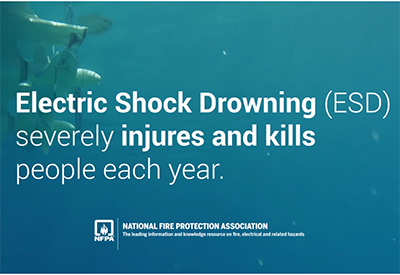NFPA UNDERSCORES ELECTRIC SAFETY IN POOLS AND AT MARINAS DURING SUMMER MONTHS

July 9, 2019
We recently received this valuable press release from the National Fire Protection Association (NFPA) in the United States. The NFPA is reminding people about potential electrical hazards that exist in swimming pools, hot tubs and spas, onboard boats and in waters surrounding boats, marinas, and launch ramps.
We are sharing this with our readers to ensure our marina and yacht club operators post No Swimming signs and share this information.
Most people have never heard of, nor are they aware of, electrical dangers posed in water environments that can result in electric shock drowning (ESD), yet each year people are injured or killed from these hazards.
Electric shock drowning happens when marina or onboard electrical systems leak electric current into the water. The current then passes through the body of a swimmer and causes paralysis. When this happens, the person can no longer swim and ultimately drowns.
Video available: https://www.youtube.com/watch?v=8oMMn8jJ5fk
NFPA reminds people about the potential electrical hazards onboard boats and in waters surrounding boats, marinas and launch ramps.
Here are tips for swimmers, pool and boat owners:
Tips for swimmers
• Never swim near a marina, dock or boatyard, or near a boat while it’s running.
• While in a pool, hot tub or spa, look out for underwater lights that are not working properly, flicker or work intermittently.
• If you feel a tingling sensation while in a pool, immediately stop swimming in your current direction. Try and swim in a direction where you had not felt the tingling. Exit the water as quickly as possible; avoid using metal ladders or rails. Touching metal may increase the risk of shock.
Tips for pool owners
• If you are putting in a new pool, hot tub or spa, be sure the wiring is performed by an electrician experienced in the special safety requirements for these types of installations.
• Have a qualified electrician periodically inspect and — where necessary — replace or upgrade the electrical devices or equipment that keep your pool, spa or hot tub electrically safe. Have the electrician show you how to turn off all power in case of an emergency.
• Make sure any overhead lines maintain the proper distance over a pool and other structures, such as a diving board. If you have any doubts, contact a qualified electrician or your local utility company to make sure power lines are a safe distance away.
Tips for boat owners
• Avoid entering the water when launching or loading a boat. Docks or boats can leak electricity into the water causing water electrification.
• Each year, and after a major storm that affects the boat, have the boat’s electrical system inspected by a qualified marine electrician to be sure it meets the required codes of your area, including the American Boat & Yacht Council. Make the necessary repairs if recommended. Check with the marina owner who can also tell you if the marina’s electrical system has recently been inspected to meet the required codes of your area, including the National Electrical Code® (NEC).
• Have ground fault circuit interrupters (GFCI) installed on the boat; use only portable GFCIs or shore power cords (including “Y” adapters) that are Marine Listed when using electricity near water. Test GFCIs monthly.
“With continued education and awareness about ESD, we can help reduce the risk of ESD from happening,” said Lorraine Carli, NFPA’s vice president of Outreach and Advocacy. “Before participating in water activities, have swimming pool equipment, hot tubs and spas, or your boat inspected by a qualified electrician; have them regularly maintained to ensure life saving measures and protection systems are functioning properly during the summer and throughout the year.”
NFPA has additional resources for swimmers, boat and pool owners, including tip sheets, checklists, and more that can be downloaded and shared. Please visit www.nfpa.org/watersafety.



























